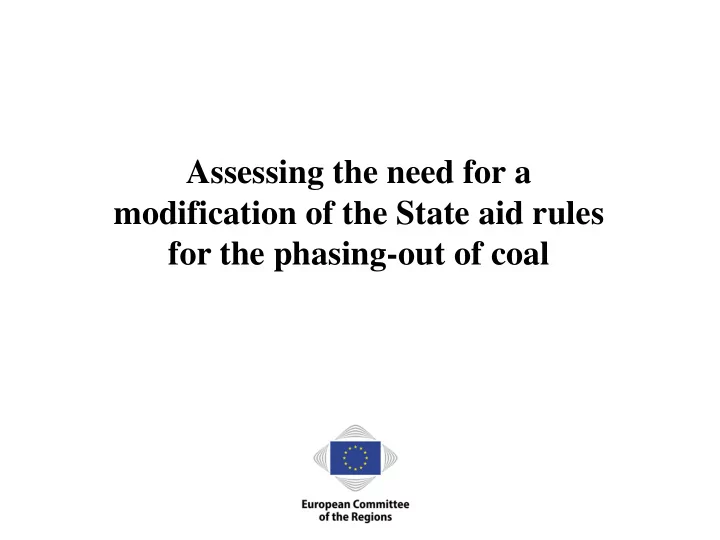

Assessing the need for a modification of the State aid rules for the phasing-out of coal
EU coal regions: challenges and the role of State Aid • Coal activities provide jobs for about 237 A crucial role for sustaining and 000 people (around 185 000 employed in coal enhancing the phasing-out mining and about 52 000 in coal-fired power process can be State aid , plants) and 215 000 indirect jobs; especially when it is designed to • One of the most tangible effects of mining stimulate innovation and green activities closing is the loss of jobs , with technologies, improve human some 160 000 expected to disappear in the capital, as well as promote growth, next decade; employment and EU • The closure of coal activities poses several competitiveness, or reduce economic, social, environmental and environmental degradation political challenges for EU coal regions; • A phasing-out process is very demanding in time and cost and necessitates significant resources; Key questions are whether coal • To support the phasing-out process, a regions need further flexibility to targeted and properly calibrated use of grant State aid to attract public funding and incentives should generate and encourage long-term investment fostering the transition investments and, therefore, new job and how much existing State aid opportunities. rules limit this flexibility
Current State Aid rules for phasing-out coal Council Decision of 10 December 2010 • Currently the only measure specifically applicable within the EU covering coal industry activities, but with a very limited scope and without considering wider EU objectives for climate change and emission reductions; • these provisions seem to be partially surpassed by general conditions potentially requiring a broad reinterpretation of coal sector support measures: in addition to encouraging mine closures these could also include measures to convert and reclaim related areas within wider regional and sub-regional development and retraining programmes. Commission Regulation (EU) No 651/2014 (GBER) - 1 • Art. 13 and 14 currently exclude regional aid to support the coal sector . This total exclusion could, if properly revised, make coal regions eligible for regional aid; • Art. 21 (Aid for access to finance for SMEs ) and Art. 22 ( Aid for start-ups ) in Section 3 constitute the legal framework for risk investments to support SMEs and could form the legal basis for an intervention , possibly managed through a financial intermediary, supporting SMEs in a specific area affected by transition (including phasing-out).
Current State Aid rules for phasing-out coal Commission Regulation (EU) No 651/2014 (GBER) – 2: • Section 4 of the GBER regulates aid for R&D and innovation ( Art. 25, 26 and 27 ). The provisions can be essential to a coal phasing-out plan . • Section 7 regulates aid for environmental protection ( Art. 38, 39, 49, 41, 42, 43 and 45 ), a whole package of measures supporting lower energy consumption and facilitating the transition to greater exploitation of renewable resources (possibly in combination with aid regulated in Section 3). These could be the most relevant measures in a plan to exit coal. Commission Regulation (EU) No 1407/2013 (de minimis) • The regulations includes thresholds and controls for non-grant aid, expanding the forms of support for companies. Application of the de minimis regulation could , for example, involve interventions supporting self-employment for people potentially affected by phasing-out coal. Other provisions Further types of aid, which substantially exceed the provisions of Regulation 651/2014 and are therefore subject to notification, may be applied if the Directorate-General for Competition assesses them as compatible. This may be, for example, specific aid for R&D through risk capital or State aid for rescuing and restructuring non-financial undertakings in difficulty.
Main findings from the case studies From six experiences of LRAs with phasing out (Castilla y Leon, Spain; Western Macedonia, Greece; North Rhine-Westphalia, Germany; Severozápad, Czech Republic; Śląskie , Poland; and South-West Oltenia, Romania): • All six regions are affected by significant social, economic and environmental problems which can be addressed only through a long-term and multi-stakeholder approach where the role of local authorities and communities is vital and should be reinforced; • They are all aware that a phasing-out process requires significant time and cost and therefore significant resources and incentives ; • They recognise the variety of current EU instruments for regions to support the transition , especially through the ESIF, and they are positive about the Transition Platform and the Just Transition Fund; • They consider State aid to be crucial in supporting the phasing-out process but current EU State aid legislation limits LRA policy initiatives ; • There is strong evidence that much more State aid flexibility is needed .
Hypotheses for introducing flexibility in State Aid rules • The Council Decision 2010/787/EU is considered insufficient and its provisions require a broad reinterpretation of coal sector support measures (i.e. measures to convert and reclaim related areas within wider regional and sub-regional development and retraining programmes). • Commission Regulation (EU) No 651/2014 (GBER) should be improved : - through a temporary or geographically limited suspension of the prohibition of application of the rules on regional aid to the coal sector (combined with investment initiatives in non-coal sectors); - and/or by defining tailored aid intensities and maximum amounts for phasing out coal specific provisions to be integrated with the GBER . These should be determined on the basis of specific provisions and to be preceded or accompanied by a precise definition of EU geographical areas and/or sectors involved in these measures. • The introduction of an exception to the application of Art. 2 (20) of the Regulation 651/2014 and increasing aid intensities also for large investments. • A temporary/specific framework for State aid when phasing out coal, following the initiative in the first months of 2009 when the Commission defined a Temporary Community framework for State aid to support access to finance during the financial and economic crisis.
Recommend
More recommend